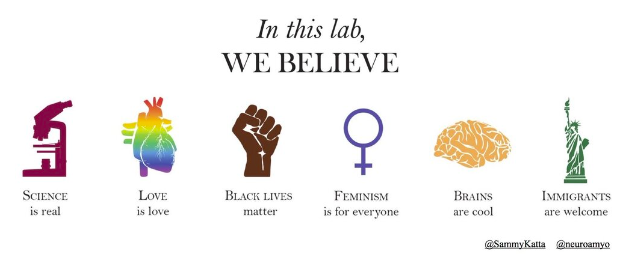Commitment to Diversity

We pledge to foster an inclusive training environment that values and supports our peers who are women, immigrants, LGBTQIA+, people with disabilities, and Black, Indigenous and People of Color (BIPOC). We strive to offer support, mentorship, experience, and inspiration students need to succeed in science or any other field of their choosing. The above image came from one such initiative during the #BlackLivesMatter and #BlackintheIvory conversation (Credit is given to the artist above).
Mentoring Philosophy
Historically, academia struggles to accommodate the diverse needs of its ever-growing population. I am here today because at key points in my career, mentors who saw me struggling stepped in to help. Today, I strive to provide similar mentoring to my own trainees. At its core, my mentoring philosophy is based around developing a relationship founded on safety and mutual respect. From this foundation, open communication in a safe environment free of judgment is essential. When trainees come to me, I allow them the space to share as much as they are comfortable with and begin by asking whether they are looking for a listening ear or for solutions. My own experiences as a mentee have shown me that a key element of mentoring is empathy, which can be difficult when a mentor does not share your life experience. Micro-aggressions and biases are deeply rooted in academia and are usually not felt or understood by those that do not experience them. I have realized this is particularly important in the past few years, leading an NIH-funded URM-graduate trainee career development program at my current institution. Instilling a sense of ownership around their career goals, in a world that continues to feel completely out of control, has helped me support them during rough times.
My trainees have all moved on to their career of choice in medical school, graduate school, biotech industry, nursing school, dental school, and others. Their successes and accomplishments, including institutional Best Graduate Student Awards, NIH Diversity Supplement Awards, NIA Summer Aging Workshop invitations and Best Speaker awards at national symposiums, reflect our successful mentor-mentee relationships. I have consistently looked for local and national opportunities to improve as a mentor, including the 2019 AAMC Early Career Women Faculty Leadership Development Seminar. These initiatives have been transformational in increasing additional opportunities for me to broaden the support I was providing for URMs in my lab. Informally, I also continue to pursue opportunities to let junior investigators ‘see’ me, speaking at career development workshops, research seminar series and ‘my journey so far’ talks, here on campus, at national Hispanic serving and Historically Black Colleges and Universities and within my international professional society.
Mentoring Commitment
I fundamentally believe that while science is important, it is nowhere near as important as the people that do it. As such, my approach to creating a lab climate that values diversity is simple: I lead by example. I will continue to create an inclusive lab climate by targeting the following areas:
Recruitment
The composition of my lab has always been diverse, composed on average of ~60% of trainees who identify as URMs. Through my outreach and visibility efforts, I will continue to engage with students of historically excluded populations and promote their individual career development both within and outside of my lab.
Retention
One of the biggest issues in STEM is not necessarily the recruitment of diverse individuals, but rather their retention. I believe retention of diverse trainees can be increased by ‘cluster hires’, similar to the NIH Common Fund Program of Faculty Institutional Recruitment for Sustainable Transformation (FIRST). Just as I benefited from a community of faculty who ‘look like me’, my lab will continue to be a self-reinforcing community of scientists, through recruitment of a critical mass of diverse scientists working together. Furthermore, I outline good lab citizenship in my lab manual DEI inclusion section, which we edit once a year as a team. The discussions generated by this group effort have been eye-opening to me and to my team, and I can attest to their contributions towards all of us growing as leaders and team members.
Advocacy
One of my mentoring goals is to empower trainees to advocate for themselves. However, as I once was, many of them are burdened by impostor syndrome, societal pressures and their existence in a system that is still understanding how to best support them. My mentoring philosophy values not just their contributions to science, but their mental health and well-being. I will continue my efforts to help trainees find their own voice, exposing the ‘hidden curriculum’ and bringing clarity to the academic research process. For example, most of my undergraduate trainees in the Deep South were not aware that PhD programs come with a stipend, and as such had not even considered entering them. This demonstrates that there is a lot of work to be done around transparency for these careers, and the opportunities available to trainees from diverse backgrounds.


